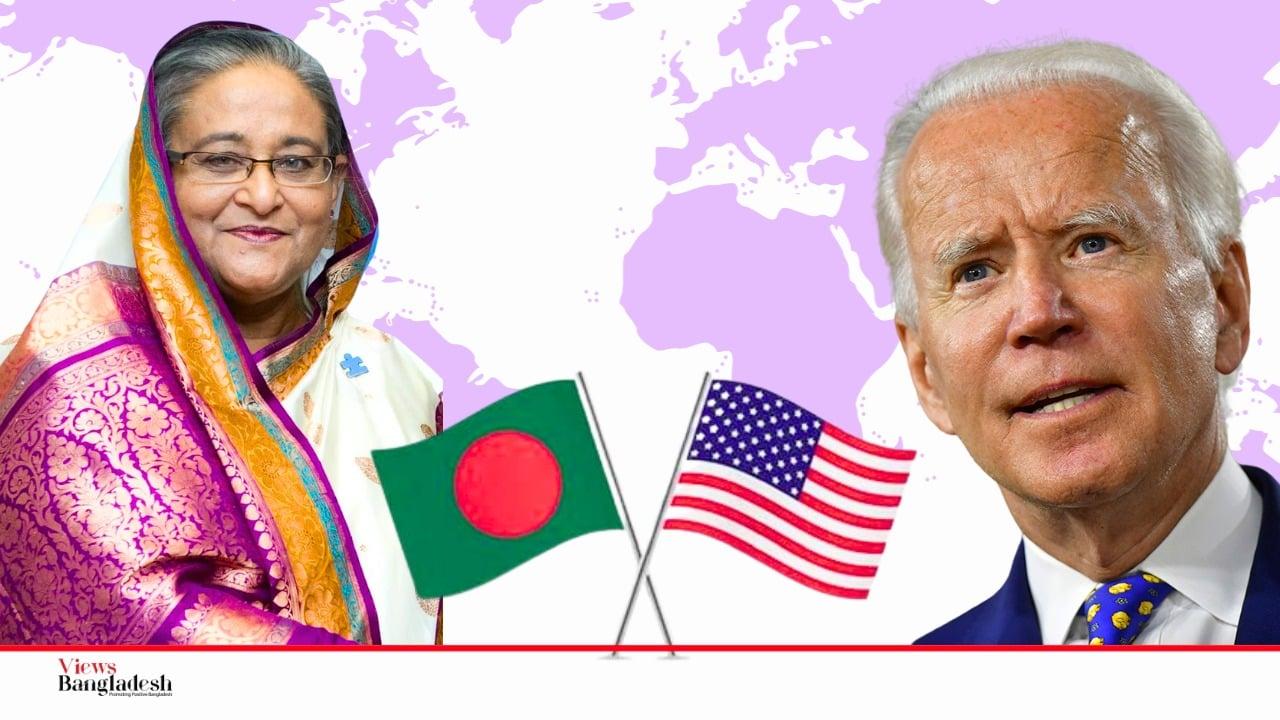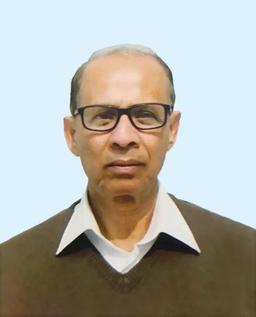America's democracy for self-interest versus Sheikh Hasina

The title of an article published in The Wall Street Journal during the prelude to our 12th national parliamentary election was "Biden's Democracy Development Encounters Limits in Bangladesh." The main assertion of the article is that under the leadership of Sheikh Hasina, Awami League is expected to win in the 12th national parliamentary election, and through this victory, President Joe Biden's foreign policy will face setbacks in Bangladesh. The election took place on January 7, and the article was published on January 3.
The article also mentions that Sheikh Hasina has won a consecutive victory four times and, in this latest election, has defeated U.S. President Joe Biden. The rationale behind this defeat is attributed to President Biden's administration attempting to pressure Sheikh Hasina's government on allegations of human rights violations and arrests of opposition figures, but Sheikh Hasina remains unyielding in the face of American threats. The Journal suggests that Joe Biden, in an effort to showcase differences with the previous administration under Donald Trump, has engaged in a diplomatic standoff with Sheikh Hasina. Over the past 15 years, the article highlights various achievements and successes under Sheikh Hasina's strong leadership, and The Wall Street Journal acknowledges that Bangladesh's democratic history stands out in comparison to many more developed nations. The article in The Wall Street Journal applauds Sheikh Hasina's steadfast leadership, pointing out numerous accomplishments under her governance that surpass those of many other developed countries.
According to the journal, Sheikh Hasina's governance has successfully maintained control over religious extremism in Bangladesh. Unlike the past sixteen years, military rule has not been imposed, and civilian dominance over military power has been ensured. The article suggests that Sheikh Hasina's government has made it possible to liberate Bangladesh from extreme poverty, and her administration has stood firmly against narcotics. The Biden administration alleges that Sheikh Hasina's government is suppressing and persecuting the opposition parties. However, The Wall Street Journal, through another statement, has granted Sheikh Hasina relief from these allegations. In the election, the Awami League secured an overwhelming majority. The preconceived notions expressed by The Wall Street Journal before the election regarding the Awami League's victory lacked thorough analysis and did not require rigorous research to make such presumptions.
The main opposition party, Bangladesh Nationalist Party (BNP), did not participate in the elections, leading to a lack of a substantial opposing force in the electoral arena against the Awami League. The Jatiya Party is gradually declining, and since the demise of HM Ershad, its leadership has been in flux, rendering the party virtually non-existent. The current leadership, like that of HM Ershad, may not stay stable and undergoes frequent changes in decision-making. Currently, the party has regionalized and secured only 11 seats. If it had not withdrawn from 26 seats, as the Awami League remained the uncontested party, the Jatiya Party's seat count would have been even lower. During the election period, many of their multi-party candidates withdrew, primarily due to organizational weaknesses within the Jatiya Party.
The opposition party's allegations do not concern development; instead, they revolve around alleged irregularities in mega projects. One such mega project is the Padma Bridge. The World Bank had raised allegations of corruption within the Padma Bridge project, even though construction had not yet commenced at that time. Therefore, asserting that there has been no corruption in the Awami League's administration is not definitive.
The current allegations regarding corruption come from the opposition party, and these claims are purely political. Despite the accusations of corruption, the Awami League's government has not encountered any major hindrance to the progress of mega projects, and the public is benefitting from these initiatives. Among the mega projects, the most popular is the metro rail. Many mega power projects have been successfully implemented, including a nuclear power project worth 100 billion taka. Production has also begun in the Karnaphuli River with the completion of the Karnaphuli Tunnel, providing a new avenue for local exploration. The expansion and modernization of Hazrat Shahjalal International Airport have been realized, opening new horizons. The development of a new expressway has facilitated swift travel to destinations using the expressway.
Development is not limited to infrastructure alone; significant funds have been spent over the past decade to ensure social security for the vulnerable and impoverished, keeping millions of underprivileged people afloat in society.
The ability to field candidates and contest elections across the country is currently limited to the Awami League and the BNP. In essence, a true electoral battle occurs within the Awami League itself, as no other party has the capacity to compete nationwide. The Wall Street Journal's remarks on development lack objectivity; substantial development has taken place in Bangladesh over the past sixteen years under various governments. However, development without continuity is not recognized in Sheikh Hasina's administration.
The Wall Street Journal suggests differences of opinion regarding development in Sheikh Hasina's tenure. It is natural for opposing parties to hold divergent views on development because if the Awami League does not acknowledge development under other governments, the opposition parties will not recognize the Awami League's development either.
The opposition party's allegations do not concern development; instead, they revolve around alleged irregularities in mega projects. One such mega project is the Padma Bridge. The World Bank had raised allegations of corruption within the Padma Bridge project, even though construction had not yet commenced at that time. Therefore, asserting that there has been no corruption in the Awami League's administration is not definitive; however, whether corruption has occurred or not can be determined when the opposition party comes into power.
The current allegations regarding corruption come from the opposition party, and these claims are purely political. Despite the accusations of corruption, the Awami League's government has not encountered any major hindrance to the progress of mega projects, and the public is benefitting from these initiatives. Among the mega projects, the most popular is the metro rail. Many mega power projects have been successfully implemented, including a nuclear power project worth 100 billion taka. Production has also begun in the Karnaphuli River with the completion of the Karnaphuli Tunnel, providing a new avenue for local exploration. The expansion and modernization of Hazrat Shahjalal International Airport have been realized, opening new horizons. The development of a new expressway has facilitated swift travel to destinations using the expressway. Not only has there been eye-popping infrastructure development across the country, Hundreds of billions of taka have been spent in the last 15 years in social safety net programmes to keep the helpless people and destitute alive.
Amid the widespread global distress caused by the COVID-19 pandemic and the Ukraine-Russia conflict, the opposition party was optimistic, envisioning a downfall of the Sheikh Hasina government. Their assumption was that the country would plunge into chaos, millions would perish due to disasters, Sheikh Hasina's government would face a humanitarian crisis, and the opposition would assume power through a popular uprising. However, at the end of the recent election, the opposition leaders wore smiles, indicating their realization that the downfall of the Sheikh Hasina government did not occur.
Recently, in the conducted election, the voluntary participation of voters was not evident, but they did not lean towards the opposition either. During the day of the election, in one corner of a gathering, I heard a voter say that the way the BNP describes the country's dire situation makes it seem like the nation is on the brink of destruction. According to them, the Awami League government has embezzled all the national assets, smuggling them abroad. In this situation, if the BNP comes to power, it will take at least five years for them to criticize the Awami League government, so it is better not to bring the BNP to power. This voter is undoubtedly a staunch supporter of the Awami League.
According to the opinion of the Wall Street Journal, Sheikh Hasina has responded appropriately to all the pressures of the United States by developing relations with Russia, China and India. This statement of the journal is partially true, no matter how many rhetorical words Sheikh Hasina's government utters, they do not have the courage and power to ignore America. Bangladesh cannot afford to risk losing its $32 billion textile export market to the US and Europe, the three countries with which it has developed ties, China and India, Bangladesh's textile export rivals. According to The Wall Street Journal's statement, the incident of Sheikh Hasina showing the 'V' sign to the United States is not true. If it were true, Russia's ship "Ural" would not have been allowed to enter Bangladesh's waters due to American sanctions. The Russian vessel, "Ural," was not permitted to enter Bangladesh's territorial limits despite its involvement in the Rooppur nuclear project, which faced opposition from the United States. Bangladesh does not have the economic condition to ignore America and Europe, because the terrible famine of 1974 was orchestrated under the influence of the United States.
Countries like Bangladesh have not been invited to the United States' democratic summits, unlike many other nations, despite having a record that is not worse than several others invited. The United States extended invitations to countries like Pakistan, which has experienced military dictatorships, and Vietnam, where a one-party socialist system led by the Communist Party is in place. Despite being ranked 107th in the Democracy Index, Bangladesh did not receive an invitation, unlike Pakistan, which holds the 73rd position.
American democracy essentially serves the self-interest of the United States. The United States primarily conducts democratic summits with the goal of establishing a new front against China and Russia. In terms of the Democracy Index, the United States ranks 30th, meaning its democratic situation is better than 29 other countries. While praise from The Wall Street Journal may not bring much joy to Sheikh Hasina, criticisms from opposition parties should also be considered with significance. The fact that the United Nations Human Rights Chief, Michelle Bachelet, has not acknowledged the government's oppression against opposition supporters, similar to Turkey's President Recep Tayyip Erdogan, where thousands of opposition supporters have been arbitrarily detained in the months leading up to the elections, is noteworthy. However, Sheikh Hasina did mention allegations of politically motivated violence, including arson, against the opposition parties, highlighting the political violence that continues to persist.
As the latest development role model, she expects to be recognized for this development both politically and institutionally by the Bangladeshi government. While confidence in the independence of the judiciary and the media has been assured in the Prime Minister's comments, Indian news portal 'Wire' has provided a contrasting viewpoint. According to Wire, the uninterrupted praise is unwarranted, and due to the absence of independent judiciary and media, economic progress and revival are not likely in the country. Therefore, while the Wall Street Journal's praise may boost Sheikh Hasina's morale in the new battle, the comments from the US and UK's leaders, considering the perspective of the freshly created challenges, should make her more vigilant and strategic, especially in terms of conducting fair elections.
Author: Former Executive Director, Bangladesh Bank


Leave A Comment
You need login first to leave a comment